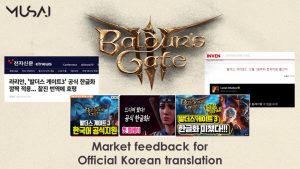[MUSAI] “One-Inch Tall Barrier” in Game, Slang and Profanity Translation in Korean
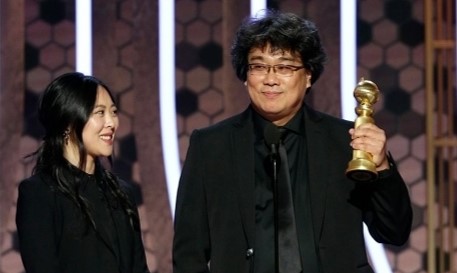
2020-01-22
Recently the world has paid huge attention to the journey of the movie ‘Parasite’ directed by Bong Jun-ho. With the start to win Palme d’Or at the 72nd Cannes Film Festival, it made another remarkable achievement by winning Best Foreign Language Film at the Golden Globe Awards. Not only were the unprecedented award-winning records a highlight, but another eye-catching moment was made during the acceptance speech of Director Bong.
“Once you overcome the one-inch-tall barrier of subtitles, you will be introduced to so many more amazing films.” – by Director Bong Jun-ho
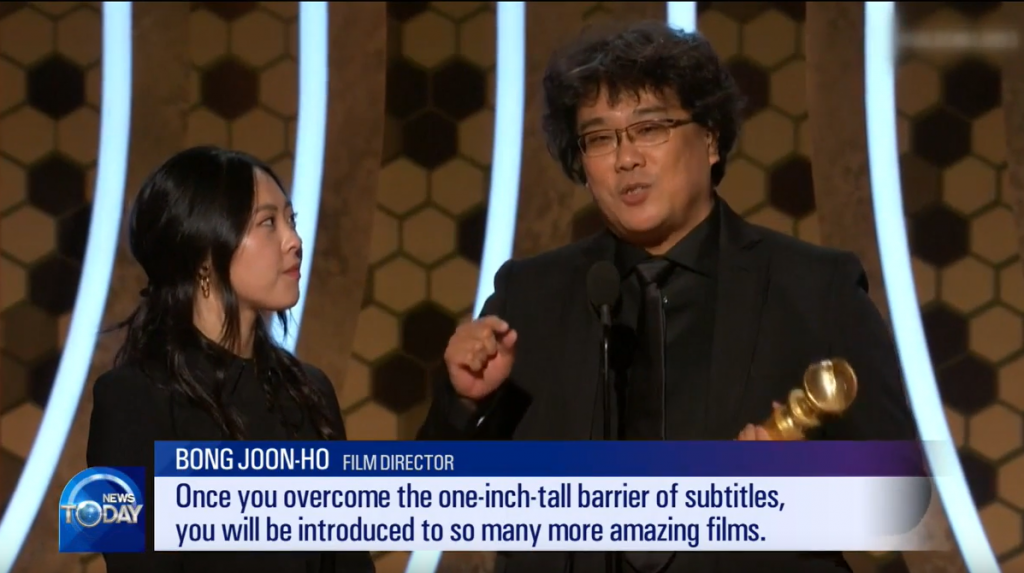
Will it be a ‘One-inch barrier’ or ‘Ten-inch barrier’?
His witty and meaningful speech, especially for those who are unfamiliar with foreign movies, was enough to astonish everyone. Furthermore, as for a game localization studio, his speech brought the deep thoughts regarding the role of translation. Regardless of the type of contents, the subtitle is an important bridge to connect between the contents and audience, otherwise it can turn into a huge barrier if the translation doesn’t work its role. That is, the translation can become a ‘one-inch’ or ‘ten-inch’ barrier for audience depends on translators. That’s why everyone gave a credit for Darcy Paquet, the translator of ‘Parasite’, and nodded at his decision to translate Japa-Guri(짜빠구리) into Ram-don(람동).
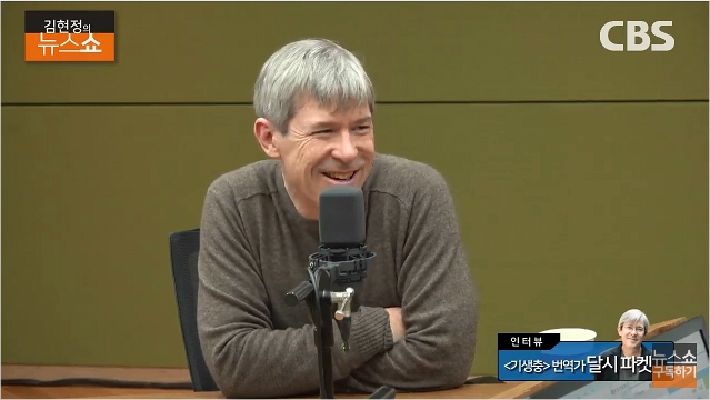
The efforts for the ‘one-inch barrier’ is also relevant in the game localization industry. There are many issues with game localization in Korea, with the most highly controversial topic being the translation of slang and profanity in Korean. Whether good or bad, it’s the one topic that attracts many people’s attention.
Why profanity within games always become an issue in Korea?
Both publishers and localization companies have a dilemma about the safe level of profanity when it comes to Korean localization. A fine balance between ‘safe’ and ‘fun’ has been controversial in Korea.
You may already notice that the Korean gaming market itself is quite conservative. The Korean localization industry has been censoring and toning down translations due to the social acceptance about games. With the constant mention of the negative impacts and influence of games, the industry has taken extra caution to avoid harsher criticism.
Even if they put aside the concern about the criticism, there still exist a realistic issue they can’t ignore. The game can be declined to release by Korean Game Rating and Administration Committee due to serious slang and profanity, and that is a big problem.
While struggling in the circumstance, publishers and Korean localization companies have kept trying to overcome this hidden wall, with questioning “what level of translation would be a success without causing problems?”

Milestone in Korean localization history, GTA 5
Finally, a historical game came out and challenged the long and boring fight. ‘GTA 5’ was launched in Korea in 2013 with a new tone, never heard before in the Korean gaming market.
GTA series was already famous for provocative contents as well as a blockbuster video game over the world. In fact, many media outlets were concerned whether the game would pass this deliberation without conflict.
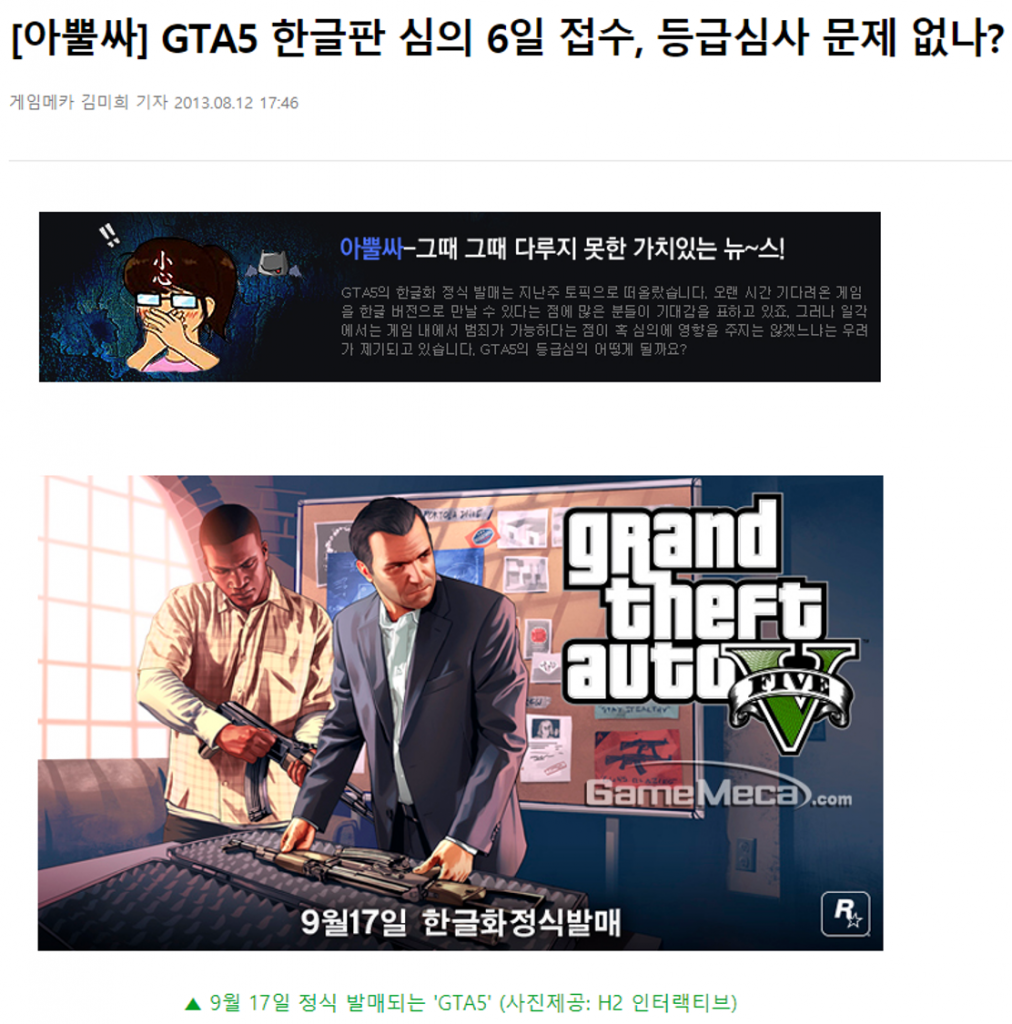
The day of launching. The fantastic collaboration made between the developer, publisher and translator, created a huge impact within the gaming industry. The game was full of “Koreanish” smart expressions in the subtitles that completely ignored the worries of finding “safe” acceptable levels of translation.
|
The most praiseworthy part while playing the Korean version of <GTA 5> is its translation. ··· The Korean version of <GTA 5> delivered perfectly the overall mood of the game through the seamless translation of all kinds of dirty jokes and gangster slang. Without this Korean translation work, it must be hard to feel the entire enjoyment <GTA 5> can provide. (Source: The article by THIS IS GAME http://bit.ly/36WEvHC ) |
The response from gamers were explosive. They were so pleased, and excited about the translation, that they even focused more on the subtitles than the gameplay itself. Many of complimentary articles and reviews about the translation were published. With starting this momentum, many adult-rated games started to follow, using all kinds of expressions without restrictions when localizing for the Korean audience. Everyone admits that games are more fun when translations are properly blended with slang and profanity according to the content, character and situation.
The reason that translation of Korean profanity is so painful
Since the gamers tasted the joy of appropriate slang and profanity in the translation, they don’t want to hear “nice profanity” like the old days anymore. The problem is that slang and profanity are very complicated to translate in Korean.
Before I explain the reason, I have to mention the special characteristic of Korean. Korean is a very sensitive language. Each Korean word has a “texture”, I would like to call it like that, so you can elaborate something with details in many ways. For example, when you talk about ‘pain’ or ‘sickness’ in English, there is one simple word for each part of body such as ‘stomachache’, ‘headache’ and ‘toothache’. In the case of Korean, you can use tons of different vocabularies such as ‘쓰리다’, ‘꼿꼿하다’, or ‘더부룩하다’, etc. instead of ‘stomachache’ and they show how much painful you feel and how different feeling you have from the pain. There are many Korean words having a same meaning but just different ‘texture’ like the example, but obviously no English words matched with them exist.
Now, let’s move to profanity translation with that concept. Not all but mostly, the swearing words and conversation in English games are combined with F-word. However, when it comes to Korean localization, the F-word can be translated in many creative ways. For example, “What the fuck are you doing?” can be translated to 1) “아 썅, 뭐 하는 거야?”, 2) “뭐 하는 짓거리야?”, 3) “뭔 헛짓거리야?”, 4) “뭔 지랄이야?”, etc. They are all same meaning with different tones, and I can list them all day long.
The first sentence included an exact cursing word, but the others don’t include. The second and third sentences used the strong vocabularies meaning of “doing”, and technically they are not cursing words. The last one used different word, “지랄” which is not direct translation of “fucking doing” but sometimes this can works better in a certain situation.
In conclusion, there’s no rule of right for the profanity translation between two languages. Linguistic sense and full of experience based on the contents can make the best.
The era only the creative one survives
Nowadays it seems to be acceptable to hear words like ‘son of bitch’ (which was impossible in Korea before) in dramas and games under a probable situation. Expansion of expression and freedom of word choice are blessings for content creators. However, as any expression including swearing words are allowed for translation, users’ expectation for the translation are going to be higher. It’s not the time to worry about whether the profanity can be acceptable or not, to worry about how suitable the profanity can be in the content.
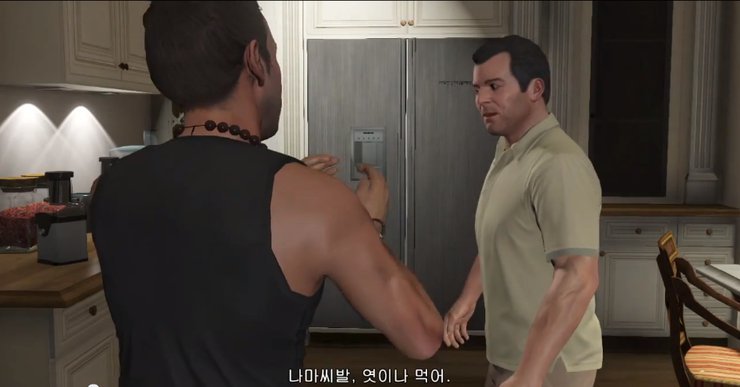
In recent years, audiences resonate with simple and normal sentences harmonized with the context, without the use of sensational buzzwords within games, dramas and movies. As a localization studio for games, we believe we can make this “One-inch barrier” that more users can jump over easily when we take on the mindset of a ‘trans-writer’, not just a ‘translator’. It may be naïve to think that only being creative in the fast-paced circumstances would suffice in the game industry which sets targets based on approaching launch dates. However, the ecosystem of localization industry will evolve with the remarkable pace faster than ever before, and only those who adapt the changes with own professionality will be chosen by users. Musai Studio, a leading force in the Korean localization industry, will never cease to create and deliver abundant games as vividly possible, with the mindset of a ‘trans-writer’.

** Did you enjoy the news of Musai? Please click Subscribe and share the story.
BOOST YOUR PLAY! Musai Studio





